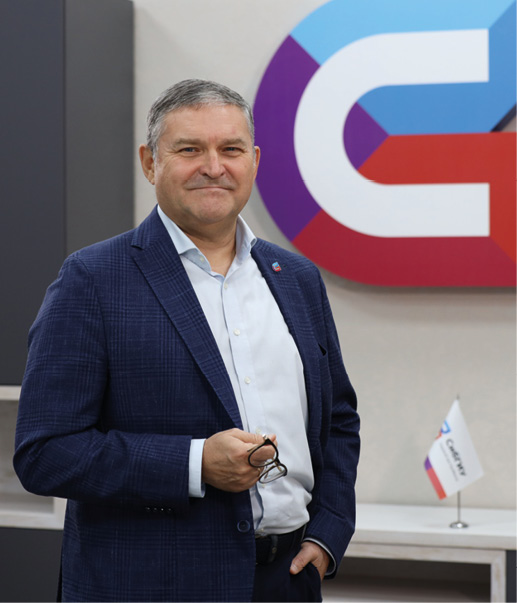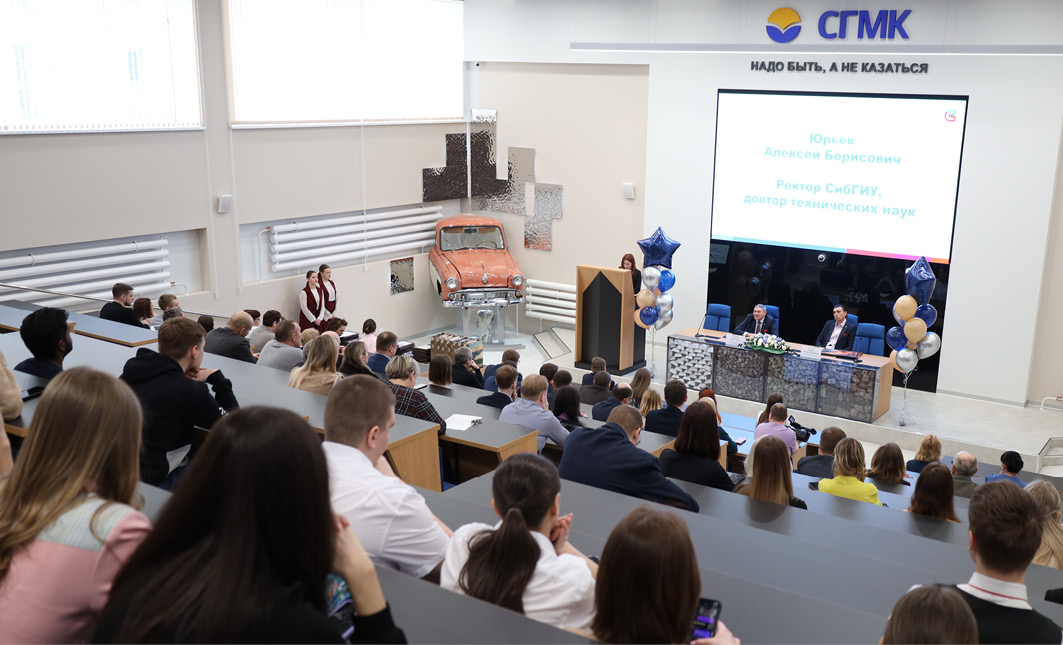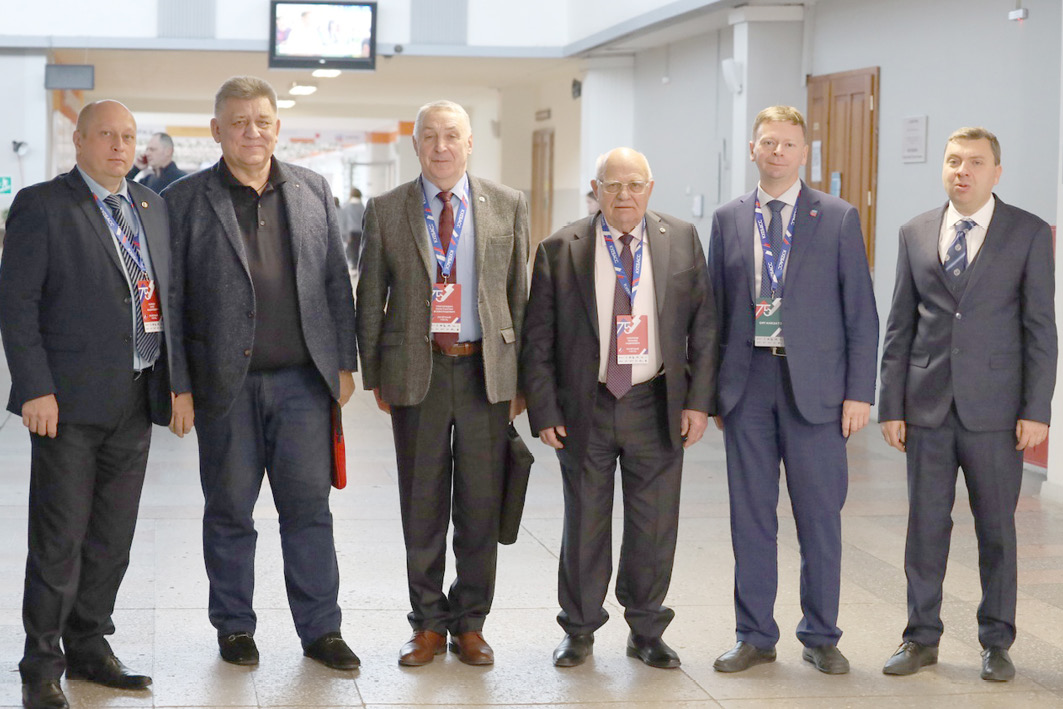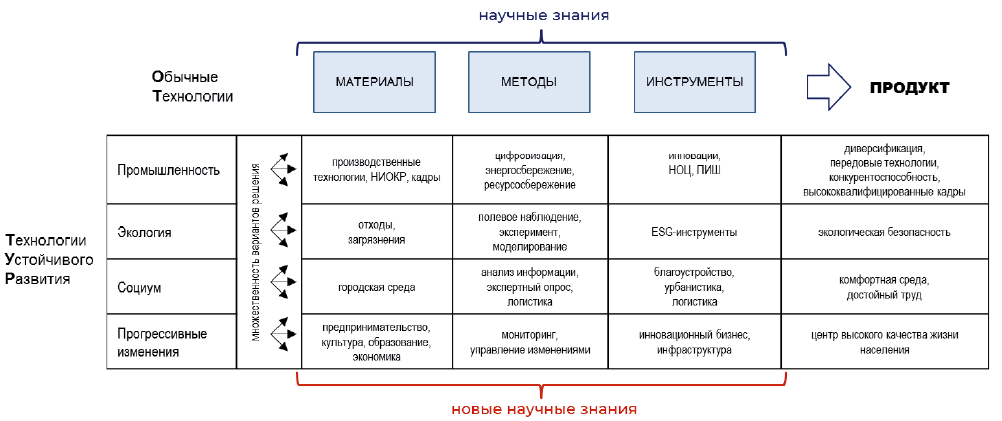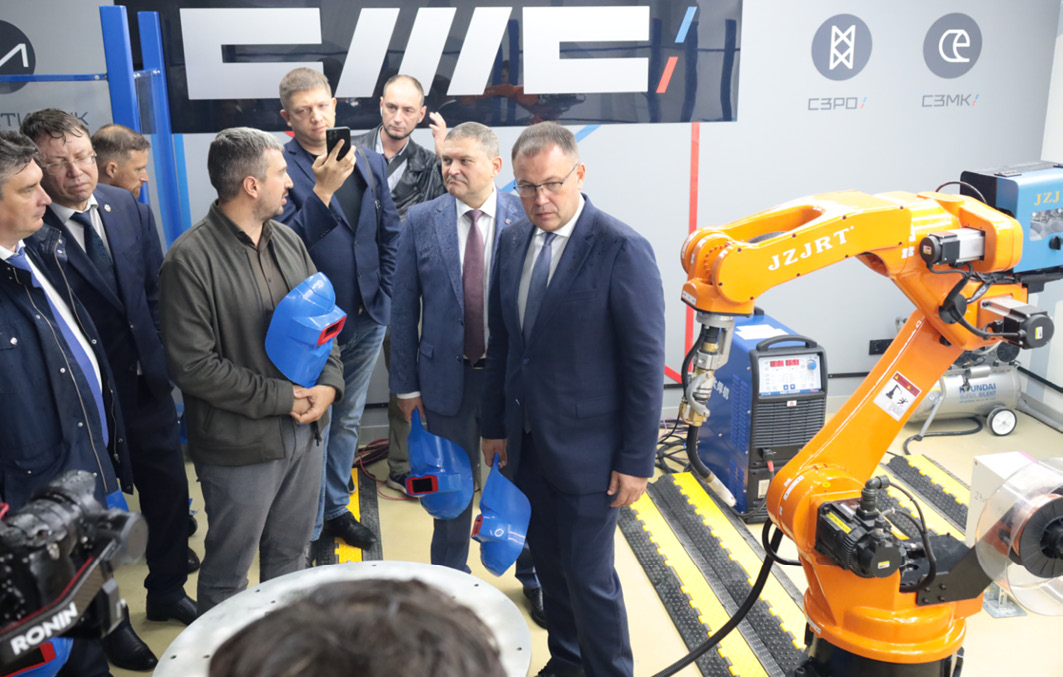Scroll to:
To the 95th Anniversary of SibSIU – the first university in Kuzbass!
https://doi.org/10.17073/0368-0797-2025-3-202-208
For citations:
Yur’ev A.B., Temlyantsev M.V. To the 95th Anniversary of SibSIU – the first university in Kuzbass! Izvestiya. Ferrous Metallurgy. 2025;68(3):202-208. (In Russ.) https://doi.org/10.17073/0368-0797-2025-3-202-208
Rector of the University, Dr. Sci. (Eng.), Professor A.B. Yur'yev |
On June 23, 2025, the Siberian State Industrial University (SibGIU) celebrates the 95th anniversary of its founding. In both Russian and international academic circles, the university is better known by its former name – the Siberian Metallurgical Institute (SMI). It operated under this name for more than 60 years, from the early 1930s until 1994, during the formative and developmental stages of its history. The establishment of a higher education institution in the remote Siberian city of Kuznetsk (later renamed Stalinsk and then Novokuznetsk) became possible thanks to the era of industrialization and the construction of the Kuznetsk Metallurgical Plant (KMK). As KMK urgently required engineering personnel, and at the initiative of Academician I.P. Bardin – Chief Engineer of Kuznetskstroi – the Siberian Institute of Ferrous Metals (SIFM) was founded on the basis of the “Ferrous Metallurgy” program at Tomsk Technological Institute. In the autumn of 1931, the institute was relocated to Novokuznetsk. SIFM thus became the first higher technical educational institution in the Kuzbass region [1; 2].
Until 1938, it remained the only university in Siberia training highly qualified specialists for metallurgical enterprises across Siberia, the Russian Far East, and Central Asia. The institute’s academic staff worked in close collaboration with KMK – not only supplying the plant with engineers but also addressing urgent applied research challenges.
The Great Patriotic War became a serious test of endurance for SMI’s academic community. At the outset of the war, the Moscow Institute of Steel (MISiS) was evacuated to Stalinsk. SMI’s metallurgists and materials scientists were entrusted with strategically important tasks. The country was in urgent need of armor-grade steel. Leading specialists from MISiS and SMI – steelmakers, rolling mill engineers, heat treatment experts, thermal engineers, and foundrymen – immediately began work. At KMK, the team rapidly mastered what were then cutting-edge technologies: smelting, casting, rolling, and heat treatment of armor steel; cutting thick slabs of tank armor; developing casting processes for 76 mm shells; and producing 82 mm mortar bombs. Professors and associate professors such as Yu.V. Grdina, I.S. Nazarov, E.Ya. Zarvin, E.Kh. Shamovskii, N.I. Kunitsyn, A.A. Govorov, and many others made significant contributions to these achievements. During the war, SMI trained 205 engineers for industry. Steel from KMK was used to manufacture 50,000 of the 108,000 tanks, 45,000 of the 95,000 aircraft, and 100 million of the 220 million shells produced in the USSR [1 – 4].
In the postwar period, the academic staff of the institute focused on training engineering professionals to support the recovery of the national economy. New academic programs were launched at SMI in the fields of mining, construction, and mechanical engineering.
In the 1990s, SMI underwent two major transitions. In 1994, it was renamed the Siberian State Mining and Metallurgical Academy (SibGGMA). Four years later, in 1998, it became the second institution in the history of Russian higher education to be granted the status of an industrial university and adopted its current name – Siberian State Industrial University (SibGIU) [4 – 7].
Over the course of its history, the university has trained nearly 95,000 specialists, including approximately 30,000 graduates in metallurgy and 12,000 in mining-related disciplines. Many of them have formed the core engineering and management personnel of mining and metallurgical enterprises across Novokuznetsk and the broader Kuzbass region. SibGIU takes pride in its alumni – many of whom have gone on to become prominent public and political figures, heads of industrial ministries, successful entrepreneurs, directors of plants and research institutions, and internationally recognized scientists [8; 9].
Today, SibGIU offers programs in secondary vocational, higher, and continuing education. The university trains skilled workers, bachelor’s and master’s students, as well as PhD and Doctor of Sciences candidates. Its total student enrollment is close to 10,000.
In the past three years, SibGIU has actively expanded its educational offerings in line with current trends in industrial production and the needs of the real economy. It has obtained licenses to offer 14 new secondary vocational programs, 2 new bachelor's degree programs, 1 master's program, and 2 new postgraduate research specializations.
As of 2025, under its current license, the university is authorized to provide training in 24 enlarged groups of academic disciplines, including 01.00.00 Mathematics and Mechanics, 05.00.00 Earth Sciences, 07.00.00 Architecture, 08.00.00 Civil Engineering and Construction Technologies, 09.00.00 Computer Science and Information Technologies 11.00.00 Electronics, Radio Engineering, and Communication Systems, 12.00.00 Photonics, Instrumentation, Optical and Biotechnical Systems and Technologies, 13.00.00 Electric and Thermal Power Engineering, 15.00.00 Mechanical Engineering, 18.00.00 Chemical Engineering, 20.00.00 Industrial Safety and Environmental Engineering, 21.00.00 Applied Geology, Mining, Oil and Gas Engineering, and Geodesy, 22.00.00 Materials Engineering, 23.00.00 Ground Transport Engineering and Technologies, 27.00.00 Systems Engineering and Control, 37.00.00 Psychological Sciences, 38.00.00 Economics and Management, 39.00.00 Sociology and Social Work, 40.00.00 Law, 42.00.00 Media and Library and Information Sciences, 43.00.00 Service and Tourism, 44.00.00 Education and Pedagogical Sciences, 45.00.00 Linguistics and Literary Studies, 46.00.00 History and Archaeology. These include 45 bachelor’s programs, 5 specialist degree programs, 32 master’s programs, 24 PhD programs, and 5 doctoral-level research specializations. In addition, SibGIU is licensed to offer 32 programs in secondary vocational education, including training for skilled workers and administrative staff, mid-level professionals, as well as general secondary education, basic vocational training, and continuing education programs.
Plenary session of the Conference |
The university includes ten institutes and a university college:
1) Institute of Metallurgy and Materials Science (established in 2010 through the merger of three faculties: the Metallurgical Faculty, which was effectively the progenitor and peer of SibGIU; the Technological Faculty – later the Faculty of Materials Science and Metal Forming, established in 1939; and the Electrometallurgical Faculty – later the Faculty of Electrothermal Technologies, established in 1972);
2) Institute of Advanced Engineering Technologies (established on the basis of the Mechanical Faculty, founded in 1960 and later renamed the Transport and Mechanical Faculty);
3) Institute of Mining and Geosystems (based on the Mining Faculty, founded in 1948);
4) Institute of Architecture and Civil Engineering (established on the basis of the Civil Engineering Faculty, founded in 1960);
5) Institute of Information Technologies and Automated Systems (established in 2011 on the basis of the Faculty of Automation, Computer Science, and Electromechanics, opened in 1995, and the Faculty of Information Technologies, founded in 2006);
6) Institute of Sustainable Development Technologies (established in 2024 as the successor to SibGIU’s Faculty of Economics, founded in 1995 and later reorganized as the Institute of Economics and Management);
7) Institute of Teacher Education (established in 2020);
8) Institute of Continuing Education (established in 2018);
9) Institute of Open Education (established in 2014);
10) Institute of Physical Education, Health, and Sports (established in 2014);
11) University College (established in 2017).
Over the past five years, SibGIU has achieved notable progress in educational development. In particular:
– a collaborative project titled “Engineering Bachelor's Program” was launched in cooperation with the university’s industrial partner, EVRAZ United West Siberian Metallurgical Plant JSC;
– network-based cooperation has been implemented in partnership with Ural Federal University and Novosibirsk State University, covering seven core educational programs;
– several career guidance initiatives have been carried out, including “Pre-University Program,” “Engineering Classes,” and “Resource Centers”.
At the SibGIU Conference (from left to right): |
In the field of continuing education, SibGIU has played an active role in the national project “Demography.” In 2024, 934 individuals from eligible categories of Russian citizens received training at the university under this project – an increase of 39.4 % compared to 2023.
In the field of scientific research, technology transfer, and commercialization of innovations, SibGIU has implemented a series of initiatives aimed at positioning the university as a key hub within a networked structure for the integrated development of high-tech, cross-sectoral innovations. In 2024, the volume of research and development (R&D) activity per academic and teaching staff member amounted to 420,300 rubles. Research outcomes have been successfully implemented and are currently in use at major Russian industrial enterprises, including EVRAZ United West Siberian Metallurgical Plant (EVRAZ ZSMK), Magnitogorsk Iron and Steel Works (MMK), Guryevsk-Stal LLC, RUSAL, Siberian Mining and Metallurgical Company (SMMC), among others.
Fundamental and applied research at the university is carried out within 15 research schools, including:
– Formation patterns of mineral deposits in sedimentary complexes;
– Strength and ductility of materials under external energy inputs;
– Development of innovative integrated cyber-physical technologies for mineral extraction and processing;
– Mathematical modeling, applied software systems, and advanced technological processes based on self-organization principles;
– Theory and practice of control automation systems based on physical-modeling approaches;
– Structural theory of mechanical systems and its application in the design of complex machinery, including mining and metallurgical equipment;
– Economics, production organization, planning, and enterprise management;
– Development and implementation of innovative coal technologies;
– Theory and practice of producing high-quality castings of ferrous and non-ferrous metals;
– Advanced surface hardening technologies for steels and alloys;
– Energy- and resource-efficient technologies for heating and metal forming;
– Resource-saving technologies for construction materials and structures based on technogenic and natural raw materials;
– Theory and practice of systems with multi-variant control architectures for organizational and technological processes;
– Cyber-physical technologies in electromechanical systems of the mining and metallurgical industry;
– Advancement of theories and development of resource- and energy-efficient technologies for ferrous metal production using technogenic waste.
The university currently operates two dissertation councils authorized to confer academic degrees in five specialties: 1.2.2 – Mathematical Modeling, Numerical Methods, and Software Packages; 2.3.4 – Organizational Systems Management; 2.6.1 – Physical Metallurgy and Heat Treatment of Metals and Alloys; 2.6.2 – Metallurgy of Ferrous, Non-Ferrous, and Rare Metals; 2.6.4 – Metal Forming.
SibGIU is a co-founder of the journals Izvestiya. Ferrous Metallurgy (indexed in the international abstract and citation database Scopus) and Basic Problems of Material Science (listed by the Higher Attestation Commission of the Russian Federation). In addition, the university publishes the journal Bulletin of the Siberian State Industrial University, which, as of 2023, has also been included in the Higher Attestation Commission list for the university’s core scientific disciplines and specialties.
The SibGIU campus is located in the city center of Novokuznetsk and covers more than 25 hectares. The total floor area of academic buildings and teaching facilities exceeds 75,000 square meters.
Since 2023, the university has been implementing the strategic initiative Technologies for Sustainable Development. The aim of this project is to ensure SibGIU’s active participation in the generation of new knowledge related to sustainable technologies, its integration into an advanced division of labor system (DLS), and its contribution to the dissemination of knowledge in this forward-looking field (see Fig. below).
Sustainable development technology as an engineering challenge |
The project is designed to establish regional leadership in sustainable development and focuses on the following objectives:
1) Refocusing the university’s research activity from fundamental science toward product-oriented outcomes. The initiative aims to reorient SibGIU’s scientific research toward advanced technological solutions and their practical implementation. These efforts encompass the use of technogenic materials; low- and zero-waste technologies; closed-loop and biomimetic processes; reduction or complete elimination of harmful emissions; land reclamation and remediation; carbon footprint reduction; and the generation of carbon units for industrial application.
2) Training the engineers equipped with advanced environmental thinking skills, capable of working with, improving, and implementing cutting-edge technologies at the university’s partner enterprises. These specialists will be prepared to participate in the emerging division of labor system (DLS) and contribute to the accelerated technological growth of companies in the real sector.
In the University laboratory |
3) Transforming campus operations in line with “Green Office” principles, health-promoting practices, and energy efficiency standards. This initiative aims to enhance the well-being and comfort of students and staff by adopting best practices in energy efficiency and environmentally responsible management. It also involves the development of SibGIU’s own innovative solutions for sustainable campus operations, which are intended for broader dissemination across institutions in the region.
4) Engaging in outward-facing, socially oriented activities to promote environmental awareness and ecological thinking among young people and the wider public. The project supports the dissemination of emerging eco-climatic trends and best practices in sustainable development across various sectors of the economy, civil society, politics, and culture.
Siberian State Industrial University (SibGIU) is a strategic partner of the Kuzbass Technopark and a member of the Kuzbass–Donbass World-Class Research and Education Center (REC). The university also participates in the Comprehensive Scientific and Technical Program (CSTP) of the full innovation cycle titled “Development and Implementation of a Technology Suite for the Exploration and Extraction of Solid Mineral Resources, Industrial Safety, Bioremediation, and the Creation of New High-Value Products from Coal Feedstock, with Progressive Reduction of Environmental Impact and Risks to Human Health” (“Clean Coal – Green Kuzbass”).
Currently, SibGIU is among the key contributors to the Strategy for the Socio-Economic Development of Kemerovo Region–Kuzbass and the Strategy for the Socio-Economic Development of Novokuznetsk Urban District through 2035. The university serves as a research and education hub for the South Kuzbass agglomeration, offering advanced training and conducting scientific research in metallurgy, mining, architecture and construction, thermal and electric power engineering, mechanical engineering and transport, chemical technologies, information technologies, economics and management, and pedagogy. In doing so, SibGIU plays a vital role in accelerating economic growth, technological advancement, and innovation-driven development across the Kuzbass region.
As SibGIU celebrates its 95th anniversary, the university’s academic staff faces new challenges and tasks with optimism, bringing forward bold plans, fresh ideas, and a strong vision for continued progress.
References
1. Berlin A.B. Siberian Metallurgical Institute. Business and people. Novokuznetsk: publishing house. Mass Media; 1992:224. (In Russ.).
2. Siberian State Industrial University: Pages of history. Kemerovo: Kuzbassvuzizdat; 2002:160. (In Russ.).
3. SMI – SibGIU. 75 years old. The chronicle. People. Events: essays on the history of SibGIU / N.M. Kulagin, S.M. Kulakov, V.A. Voskresensky et al. Kemerovo: Kuzbass; 2005:304. (In Russ.).
4. Protopopov E.V. Siberian State Industrial University: 90 years in education and science. Problems of ferrous metallurgy and materials science. 2020;(2):95. (In Russ.).
5. Protopopov E.V. We are proud of the past, developing in the present, creating the future! Izvestiya. Ferrous metallurgy. 2020;63(5):291-297. (In Russ.).
6. SibGIU Institute of Metallurgy and Materials Science. Affairs. Events. People / Protopopov E.V., Temlyantsev M.V., Galevsky G.V., kozyrev N.A., Fastykovsky A.R., Korotkov S.G., Kalinogorsky A.N. Novokuznetsk; SibGIU; 2020:127. (In Russ.).
7. Protopopov E.V., Galevsky G.V., Temlyantsev M.V. Institute of Metallurgy and Materials Science of SibGIU: History, scientific and educational activities, achievements. Bulletin of the Siberian State Industrial University. 2020;(2(32)):4–9. (In Russ.).
8. Protopopov E.V. Siberian State Industrial University is 85 years old. Izvestiya. Ferrous metallurgy. 2015;58(5): 293–298. (In Russ.).
9. Protopopov E.V. On the 85th anniversary of the Siberian State Industrial University. Bulletin of the Siberian State Industrial University. 2015;(1(11)):3–4. (In Russ.).
About the Authors
A. B. Yur’evRussian Federation
Aleksei B. Yur’ev, Dr. Sci. (Eng.), Prof., Rector
42 Kirova Str., Novokuznetsk, Kemerovo Region – Kuzbass 654007, Russian Federation
M. V. Temlyantsev
Russian Federation
Mikhail V. Temlyantsev, Dr. Sci. (Eng.), Professor of
the Department of Thermal Power Engineering and
Ecology
42 Kirova Str., Novokuznetsk, Kemerovo Region – Kuzbass 654007, Russian Federation
Review
For citations:
Yur’ev A.B., Temlyantsev M.V. To the 95th Anniversary of SibSIU – the first university in Kuzbass! Izvestiya. Ferrous Metallurgy. 2025;68(3):202-208. (In Russ.) https://doi.org/10.17073/0368-0797-2025-3-202-208



